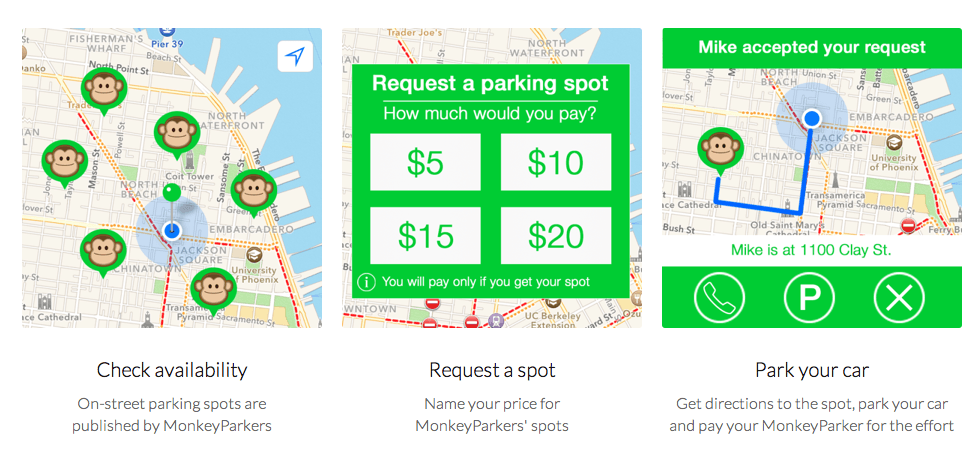
by Sheren Javdan
June 25, 2014
No more monkeying around for Italian based startup MonkeyParking, which operates out of San Francisco. The startup offers users a mobile application that allows users to auction their parking spaces to the nearby public for a nominal fee. San Francisco City Attorney Dennis Herrera however, is putting a stop to all this monkey business.
How it Works
Drivers leaving a parking spot notify other users of the application in exchange for a fee and of course the actual spot. Drivers looking for a parking spot can place bids on available spots using the application in exchange for the spot. The spots are being sold for $5, $10 and sometimes $20 on top of the actual parking fees.
Legal Issues
Herrera issued startup CEO Paolo Dobrowolny a cease-and-desist demand letter earlier this week stating the company is engaged in the illegal business of monetizing on public parking spaces. The letter demands MonkeyParking stop their business by July 11 or they could be faced with severe penalties. The startup can face administrative penalties up to $300 for each violation. In addition, the letter states that because the company’s business is illegal, the startup will be subject to civil penalties of up to $2,500 per violation.
The cease-and-desist also requests that Apple Inc. remove the application from its Apple Store for it violates the company’s own guidelines. Apple guidelines state that all applications must be in compliance with all legal requirements of the geographical location in which they are available.
Two other startups engaged in similar parking auctioning business are facing similar chargers. Sweetch charges users a $5 flat fee for obtaining a parking spot using their application. Users who “auctioned” their spot to other users then receive $4 of that fee. ParkModo, intended for public release later this week, offers drivers $13/hour to find and occupy public parking spaces during peak hours and later sell them to users.
Company founder Daniel Shifrin defends that ParkModo’s business is based on a legal exchange of “information for money.” Shifrin goes on to say “that’s how our economy runs … last time I looked at the Constitution … there is nothing about that you can’t exchange information with someone else unless you’re exchanging state secrets or trading inside information.”
Precedent
Herrera’s legal tactic is just the latest in the recent spree of government agencies and lawmakers attacking new business startups. Internet startups that use mobile applications to connect users with transportation, housing and television services have all recently faced road bumps implemented by government agencies.
Wednesday, the Supreme Court held that Aereo Inc., a startup company offering online video streaming, was in violation of Federal copyright laws and was ordered to cease all operations.
Just recently, popular ride sharing application Uber Inc., received a cease and desist letter from the Taxicab Bureau stating the startup was in violation of local city codes and lacked the required registrations. New York Attorney General Eric Schneiderman recently subpoenaed the information of Airbnb Inc., a website offering house sharing for users, to determine whether or not the startup’s practices violate housing and occupancy tax laws.
With the Internet continuing to evolve, it is inevitable that other startups will face similar legal issues. At a time where applications can do our groceries, control our credit cards and even drive our cars we must learn to accept new businesses and allow the creative minds behind them to flourish.
Topics: Aereo, Apps, Small Business, Startups












